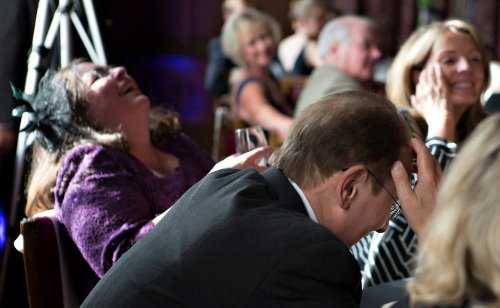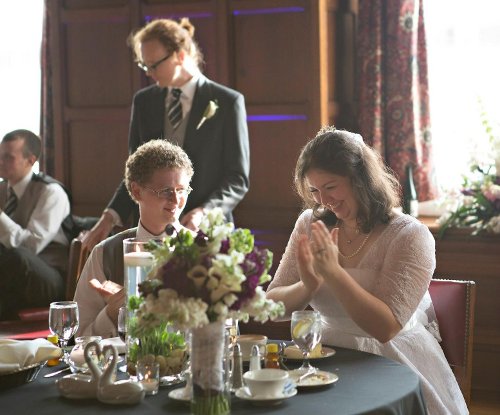| BLOG |
Carl McTague
mathematician, composer, photographer, fiddler |
Existential Angst
My toast to my sister at her wedding
I’m not very good at speaking in public. I mean, it’s my job—I’m a university lecturer—but that’s different. There’s a blackboard and if I speak into it then the sound waves reflect to the audience, and if I wait long enough then by the time I turn round everyone’s gone.
When I started thinking about giving a wedding toast, I thought of something a friend of mine, a very grand man, the Professor of Algebraic Surgery at the University of Edinburgh, once told me about his father’s wedding. His father is the German literary critic Marcel Reich-Ranicki. Most of you have probably never heard of him, but in Germany he’s a household name. Think of him as the German Harold Bloom, except that in Germany, as hard as it may be to believe, literary critics are A-list celebrities.
In 1940 Reich-Ranicki and his entire family found themselves in the Warsaw Ghetto. Two years later he learned that his life would be spared but his fiancée’s would not, unless he married her immediately. At the hastily organized wedding, he was suddenly struck by the words:
Ward je in dieser Laun’ ein Weib gefreit?
That’s an archaic German translation of a line from Shakespeare’s Richard III:
Was ever woman in this humour wooed?
A recent BBC radio program began with a speech by Reich-Ranicki about his wedding, and went on to explore Shakespeare’s ability to speak across so many cultures and ages. That made me wonder what Shakespeare might have to say to us on this occasion.
Unfortunately I’m no literary genius so the first words which struck me were:
To be, or not to be
Seeing my little sister get married before me does affect my outlook in various ways. But it doesn’t throw me into existential angst. Even if my parents wish it would.
Actually, the reason I thought of that quotation first was because in thinking about Nazis and Shakespeare, I immediately thought of Ernst Lubitsch’s 1942 film To Be or Not to Be. It’s about a troupe of actors in Nazi-occupied Warsaw who use disguise and acting to fool the occupying troops. Jack Benny plays a Shakespearean actor whose wife instructs her secret lover to wait in the audience until Benny begins Hamlet’s famous soliloquy, at which point he is to walk out and come to her dressing room, as this will assure their privacy. The scene recurs throughout the film with a very funny twist in the final scene, which I won’t spoil for you. The film is hilarious and clearly influenced Quentin Tarantino’s Inglorious Basterds in many ways. But I digress.
The next Shakespeare quotation I thought of was:
See, how she leans her cheek upon her hand!
O, that I were a glove upon that hand,
That I might touch that cheek!
The bride is indeed exceedingly gorgeous today, but what an incestuous thing for a brother to say in a wedding toast!
Finally I thought of Sonnet 116:
Let me not to the marriage of true minds
Admit impediments. Love is not love
Which alters when it alteration finds,
Or bends with the remover to remove:
O no! it is an ever-fixed mark
That looks on tempests and is never shaken;
It is the star to every wandering bark,
Whose worth’s unknown, although his height be taken.
Love’s not Time’s fool, though rosy lips and cheeks
Within his bending sickle’s compass come:
Love alters not with his brief hours and weeks,
But bears it out even to the edge of doom.
If this be error and upon me proved,
I never writ, nor no man ever loved.
Stunning and very appropriate for this couple today. [And isn’t it wonderful that in Shakespeare’s English, “prove” rhymed with “love”?]
But there is a higher authority than Shakespeare, at least for this particular audience, and I want to close with some of his words.
Love:
Humans do claim a great deal for that particular emotion.
The man who said those words, as many of those gathered here today probably already know, was:
Spock
To the bride and to love!

